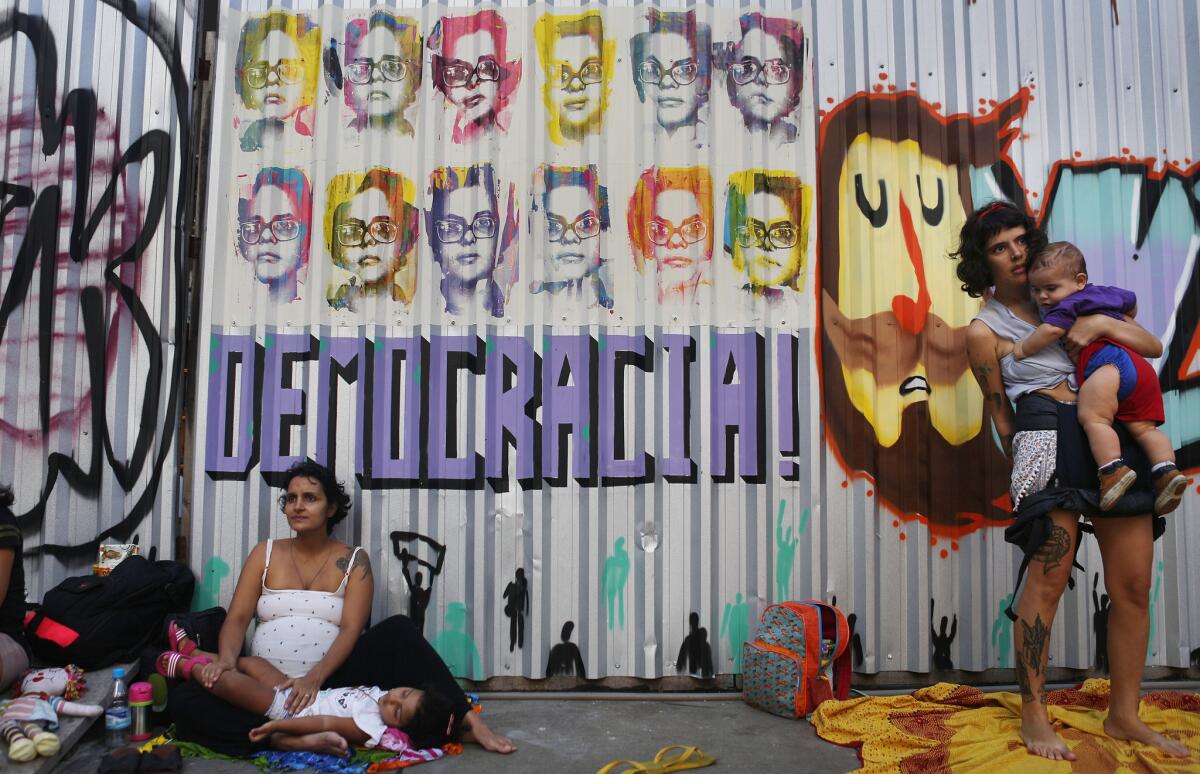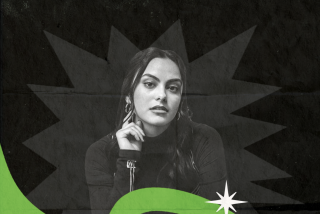Brazil’s new opposition: Artists, musicians and filmmakers

As performer after performer appeared on the outdoor stages, the Virada Cultural festival in Sao Paulo quickly turned into a massive protest against Brazil’s new acting president, Michel Temer, and the conservative government he installed following the impeachment of his predecessor less than two weeks ago.
One rock band, Nacao Zumbi, led the crowd in chants that echoed through the center of the city: “Temer out! Temer out!”
Rapper Criolo performed in front of a giant electronic sign that proclaimed “Never Temer,” playing on a double meaning. In Portuguese, temer means “to fear.”
The newest force opposing Brazil’s interim government is not a political party but the country’s popular musicians, filmmakers, writer and artists, whose organization and legacy of left-wing activism make them formidable adversaries.
“I knew there would be some demonstrations, but I had no idea they would be everywhere, on practically every stage,” said Érica Alves, a 29-year-old electronic musician who performed at the festival Sunday and led her fans in anti-government chants. She said it felt strange leading a political rally for the first time in her life. “But I think it’s important for artists to speak out now,” she said.
They already have scored one victory. Upon launching his government, Temer announced that he was folding the Ministry of Culture into the Ministry of Education, part of an effort to reduce bureaucracy and cut spending amid one of Brazil’s worst recessions in decades.
But on Saturday, after a week of protests in which artists occupied public buildings in 18 states, Temer reversed that decision. The new culture minister called it a “gesture” to the creative community, but it also was the first public defeat of the new government. The occupations continue.
Until two weeks ago, Temer was vice president, a position to which he was elected in 2014 in a cross-party alliance with President Dilma Rousseff. But he assumed the top job after Brazil’s senate voted to put Rousseff on trial for accounting irregularities in the national budget.
See the most-read stories this hour >>
It is unclear when the trial will begin, but it must be completed within the 180-day period that Rousseff has been suspended from office. If convicted, she will be permanently removed, in which case, Temer could remain in office until her term ends in 2018 and new elections are held.
There also is a possibility that he could be removed before then, if investigators looking at campaign financing in the last election can substantiate allegations that he and Rousseff received illegal donations.
While Rousseff saw her ratings plunge over the past two years, to the point that a majority of Brazilians favored impeachment, a recent poll found that Temer, a 75-year-old lawyer, is even more unpopular.
Critics view the impeachment as a power grab orchestrated by members of congress facing corruption allegations and trying to avoid prosecution. Many say that Rousseff is innocent of any crime and that she is a victim of a coup d’état.
They also accused Temer of trying to balance the budget on the back of the poor while his wealthy allies avoid paying their fair share.
Brazil’s artists and intellectuals have a history of left-wing activism dating back to before the country’s last military dictatorship, which ruled from 1964 to 1985. During that period, the artists community became even more organized and unified as it worked to oppose the regime. “There are deep historical roots to the artistic community’s opposition to the government,” says Laurindo Leal Filho, sociologist and media analyst at the University of Sao Paulo. “In general most of our artists have tended to come from a more critical tradition.
“At the beginning of the dictatorship, the arrival of censorship served as a fuse, and led even less politically active artists to take a stance,” he said. “The attempt to remove the Ministry of Culture may have served as the same fuse for them to oppose Temer now.”
The artists now protesting the new government include several who lived through the oppression of the 1960s and 1970s. Rock legend Caetano Veloso, who was exiled during the dictatorship and now writes a newspaper column, modified one of his songs last week to include the lyric “I hate you, Temer.”
Political conservatives have struck back against the artists and chided them for accepting government arts funding.
“You say there has been a coup état [sic] in Brazil,” tweeted Lúcia Guimarães, a columnist at the right-leaning newspaper O Estado de S. Paulo. “Then then you take millions of $ from coup plotters to make your film, tour [the] country with your band?”
The most aggressive shot taken at Temer came last week from the Cannes Film Festival in France, where acclaimed Brazilian director Kleber Mendonça Filho and the cast of his movie “Aquarius” stood on the red carpet holding signs denouncing a “coup” in Brazil and declaring, “The world cannot accept this illegitimate government.”
“We hit a nerve,” he said from France this week in a chat over Facebook. “It was a reaction to what was happening, using the gigantic media presence in Cannes in our favor. What we did was an act of self-defense.
“The artists’ job is to present an artistic portrait of their society, and to make sure that portrait is honest,” he said. “If you, as an artist, have a talent for that type of interpretation, your art has a political dimension and it’s up to society to understand and react.“
MORE ON BRAZIL:
Three months before Olympics, Brazil suddenly has a lot to resolve
Olympic leaders hopeful amid Brazilian political turmoil
Impeachment or coup? As vote on president’s future nears, Brazilians take to streets in protest
Bevins is a special correspondent.
More to Read
Start your day right
Sign up for Essential California for news, features and recommendations from the L.A. Times and beyond in your inbox six days a week.
You may occasionally receive promotional content from the Los Angeles Times.






